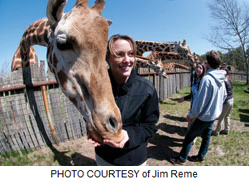Elephants, dolphins and rhinoceros
 These are just a few of the animals that students have the chance to interact with this semester and observe in the new Field Experience: Six Flags Wild Safari course being offered this spring. It is an upper level course being offered to 15 psychology students for the first time. The course includes visits to Six Flags as well as class meetings, library research and journaling of on-site supervised exposure to the animals. The class was the brainchild of Dr. Lisa Dinella, Assistant Psychology Professor at the University.
These are just a few of the animals that students have the chance to interact with this semester and observe in the new Field Experience: Six Flags Wild Safari course being offered this spring. It is an upper level course being offered to 15 psychology students for the first time. The course includes visits to Six Flags as well as class meetings, library research and journaling of on-site supervised exposure to the animals. The class was the brainchild of Dr. Lisa Dinella, Assistant Psychology Professor at the University.
The idea of a relationship between animals and University students clicked when Dinella went to Six Flags in the summer with her children and said that while she was attending the dolphin pre-show, she realized that they were discussing many of the same concepts that she was teaching in her intro class. She said she stayed after the show and asked if it was possible for students to actually see the trainers interacting with the animals. Dinella discovered something interesting about the background of some of the Six Flag animal trainers.
“Well, what we found is that most of us didn’t know until I started this that almost all the animal trainers that work there have a psychology background in some way, sometimes even a psychology degree,” Dinella said. “So most of the principles of training animals have psychological principles in their foundation.”
The response from Six Flags was excitement, so honors students and members of the Psych Club were invited to visit the animals. “Students travel to Six Flags once every fall for a seminar where they kind of get a mini version of the course,” Dinella added. “Then, over the summer, Six Flags contacted me back and said, ‘This has been very successful, can we expand on this?’ As far as we know, this is the first University course like this, to be able to bridge psychology students with a hands-on animal training program.”
Responses for the class has been immense. “My email box is filled constantly with students who want to take it next semester, because we just opened it up for next semester as well,” Dinella said. “The first interest session that we had there were seats for 60 in the class, the seats were filled, people were sitting on the floor and there was a line out the door.”
“I love animals and I love psychology, so as soon as I heard that I could combine the two, I couldn’t pass up the opportunity – especially hands-on experience with exotic animals,” said Juliana Pierce, a senior psychology major.
Dinella said that the reason for the course’s popularity is because it has an across-the-board interest for students. Students do not have to be specifically interested in animals, but may be interested in working with children because teachers utilize some of the same basic principles in education.
“Everything we learn in the class is useful whether we want to work with animals in our future or not,” Pierce added. “The principles for shaping human behavior are exactly the same and we will all be working with humans.”
Students are actively involved with the animals and visit Six Flags twice per month. “They go every other Tuesday and then we meet on Saturday mornings for a three-hour processing session,” Dinella explained. “So we meet here at Monmouth and the students do presentations on a particular concept that was covered in the course.” The students also do a round table discussion. “Then every student ties back something that they learned with their own life or career goals.”
These hands-on experiences that Six Flags is offering students helps them understand concepts more actively. Dinella said that students have a better comprehension of the material. “The concepts are being reinforced in a more applied setting and I think any time that you can see a concept work it changes it, adds that layer of learning that’s missing sometimes as hard as we try in the classroom setting,” she said.
Pierce expressed a similar reaction. “In the classroom, we learn about all the psychological concepts related to shaping behavior,” she said. “After we learn about the concepts, we see their practical applications in animal training.”
Some of the animals that students get the opportunities to interact with range from giraffes and exotic reptiles to bottlenose dolphins and African elephants. “I actually gained a new favorite animal this semester,” Pierce said. “I always liked giraffes, but I never realized how cute they are until I was feeding one out of my hands.”
At the moment, this course is being offered to upper level psychology students, mainly juniors and seniors, but there is hope that in the future it will branch out to more students. “In t he f uture we would like to expand the relationship between Six Flags and the students, maybe to have students from other areas be involved, but also doing more research-based programs so they can actually do research on what works, what doesn’t work, and animals in general and observational research,” Dinella said.
PHOTO COURTESY of Jim Reme


